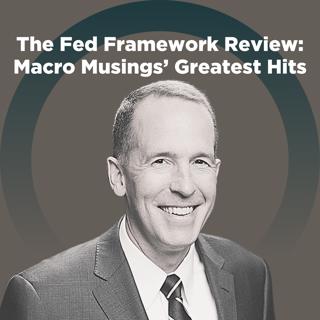
49 - Jeffrey Frankel on Recession-Dating, the Plaza Accords, and Globalization
Jeffrey Frankel is a professor and economist at Harvard University and the director of the Program in International Finance and Macroeconomics at the National Bureau of Economic Research (NBER). He joins the show to discuss serving on the NBER’s Business Cycle Dating Committee, which officially declares the start and end of recessions. David and Jeff also discuss the monetary history of the Plaza Accord, an international agreement in 1985 to devalue the U.S. dollar. Jeff also shares his thoughts on globalization in the past few decades and current-day challenges facing it. David’s blog: http://macromarketmusings.blogspot.com/ Jeff Frankel’s Harvard profile: https://www.hks.harvard.edu/about/faculty-staff-directory/jeffrey-frankel Jeff Frankel’s NBER publications: http://www.nber.org/authors/jeffrey_frankel David’s Twitter: @DavidBeckworth Related links: “Globalization of the Economy” by Jeffrey Frankel https://www.hks.harvard.edu/fs/jfrankel/NyeGlobWPwFigPost.pdf “Globalization and Chinese Growth: End of Trends” by Jeffrey Frankel http://scholar.harvard.edu/frankel/publications/globalization-and-chinese-growth-ends-trends “The Plaza Accord: 30 Years Later” by Jeffrey Frankel https://www.hks.harvard.edu/fs/jfrankel/PlazaAccord-PIIE2016.pdf
20 Mars 20171h

48 - Jason Furman on Fiscal Stimulus, the Platinum Coin, and Male Labor Force Participation
Jason Furman is a senior fellow at the Peterson Institute for International Economics. Previously, he served as the Chairman of the Council of Economic Advisers under President Obama. He joins the show to reflect on his time in the Obama Administration. Among other things, Jason and David discuss the efficacy of fiscal policy, the fiscal multiplier, and whether the platinum coin was ever seriously considered. They also discuss the problem of declining male labor force participation, its causes, and possible solutions. David’s blog: http://macromarketmusings.blogspot.com/ Jason Furman’s PIIE profile: https://piie.com/experts/senior-research-staff/jason-furman David’s Twitter: @davidbeckworth Jason Furman’s Twitter: @jasonfurman Related links: “The New View of Fiscal Policy and Its Application” by Jason Furman http://voxeu.org/article/new-view-fiscal-policy-and-its-application “The Long-Term Decline in US Prime-Age Male Labor Force Participation” by Jason Furman http://voxeu.org/article/long-term-decline-us-prime-age-male-labour-force-participation-and-policies-address-it
13 Mars 201759min

47 – Larry White on India’s Demonetization and Austrian Macroeconomics
Larry White is a professor of economics at George Mason University and has written widely on monetary theory, free banking, and the Austrian School of Economics. Today, he joins the show to discuss the recent demonetization efforts in India to crack down on corruption. White argues that India’s efforts to end the circulation of large notes and begin the circulation of new notes is having pernicious effects on the Indian population. He and David also discuss Austrian Business Cycle Theory, how this theory was developed by great economists such as Ludwig von Mises, and how the theory may have played a role in the lead up to the Great Recession. David’s blog: http://macromarketmusings.blogspot.com/ Larry White’s GMU profile: http://economics.gmu.edu/people/lwhite11 Larry White’s Alt-M archive: https://www.alt-m.org/author/white/ David’s Twitter: @davidbeckworth Larry White’s Twitter: @lawrencehwhite1 Related links: “India’s Currency Cancellation: Seigniorage and Cantillon Effects” by Larry White and Shruti Rajagopalan https://www.alt-m.org/2016/11/28/indias-currency-cancellation-seigniorage-and-cantillon-effects/ *Free Banking in Britain: Theory, Experience and Debate 1800-1845* by Larry White https://www.amazon.com/Free-Banking-Britain-Experience-1800-1845/dp/0255363753 *The Clash of Economic Ideas: The Great Policy Debates and Experiments of the Last Hundred Years* by Larry White https://www.amazon.com/Clash-Economic-Ideas-Debates-Experiments/dp/110762133X *The Theory of Money and Credit* by Ludwig von Mises https://www.amazon.com/Theory-Money-Credit-Ludwig-Mises/dp/1442175958
6 Mars 201758min

46 – Tim Duy on the Art of Fed Watching and the Future of U.S. Monetary Policy
Tim Duy is a professor of economics at the University of Oregon and a widely read “Fed Watcher.” Today, he joins the show to discuss writing on the Federal Reserve and how to interpret statements from Fed officials. In particular, Tim stresses the importance of the Fed Chair’s post-FOMC meeting press conferences. He also warns against taking too much stock in FOMC minutes. David and Tim also discuss the proper role of the Fed’s balance sheet in stabilizing monetary policy. David’s blog: http://macromarketmusings.blogspot.com/ Tim Duy’s homepage: http://pages.uoregon.edu/duy/ Tim’s “Fed Watch” blog: http://economistsview.typepad.com/timduy/ Tim’s Bloomberg archive: https://www.bloomberg.com/view/contributors/AC6KX2KfHjM/timothy-a-duy David’s Twtter: @davidbeckworth Tim’s Twitter: @TimDuy
27 Feb 20171h 2min

45 – Hester Peirce on *Reframing Financial Regulation*
Hester Peirce is a Senior Research Fellow at the Mercatus Center at George Mason University and director of Mercatus’ Financial Markets Working Group. She joins the show to discuss the new Mercatus book, *Reframing Financial Regulation: Enhancing Stability and Protecting Consumers*, which she coedited. The book examines the problems with the United States’ current financial regulation regime (including the Dodd-Frank Act) and offers alternative policies that rely less on a centralized regulation and more on market discipline. David’s blog: http://macromarketmusings.blogspot.com/ Hester’s Mercatus profile: https://www.mercatus.org/hester-peirce David’s Twitter: @davidbeckworth Hester’s Twitter: @HesterPeirce *Reframing Financial Regulation: Enhancing Stability and Protecting Consumers* edited by Hester Peirce and Benjamin Klutsey https://www.mercatus.org/publications/reframing-financial-regulation
20 Feb 201755min

44 - Sebastian Mallaby on Alan Greenspan's Legacy
Sebastian Mallaby is a senior fellow at the Council on Foreign Relations and a contributing columnist for the Washington Post. Today, he joins the show to discuss his new book, *The Man Who Knew: the Life and Times of Alan Greenspan,* a biography of the former Fed Chairman. Sebastian describes Greenspan’s humble origins, his rise to power, and his public career that spanned several decades. David and Sebastian discuss the degree to which Greenspan should be praised for the economic stability of the Great Moderation and blamed for the Great Recession. They also chat about Greenspan’s musical talents, his relationship with Ayn Rand, and his reputation as a “ladies man.” David’s blog: http://macromarketmusings.blogspot.com/ Sebastian’s bio: http://www.cfr.org/experts/financial-crises-regional-security-economics/sebastian-mallaby/b4452 Sebastian’s Washington Post archive: http://www.cfr.org/experts/financial-crises-regional-security-economics/sebastian-mallaby/b4452 David’s Twitter: @davidbeckworth Sebastian Mallaby: @scmallaby *The Man Who Knew: the Life and Times of Alan Greenspan* by Sebastian Mallaby http://www.cfr.org/international-finance/man-knew/p37530
13 Feb 201758min

43 – Eswar Prasad on Chinese Monetary Policy – Past and Present
Eswar Prasad is the Tolani Senior Professor of Trade Policy and Professor of Economics at Cornell University and a senior fellow at the Brookings Institution. He joins the show to discuss his new book, *Gaining Currency: The Rise of the Renminbi,* which examines the rise of China’s currency, the renminbi (RMB), and its role in global finance. Prasad argues that the RMB is on the road to becoming a reserve currency, but it will not challenge the US dollar’s dominance as a safe haven currency. David and Eswar also discuss China’s interesting history as the first country with paper money and a fiat currency. David’s blog: http://macromarketmusings.blogspot.com/ Eswar’s Cornell homepage: http://prasad.dyson.cornell.edu/ Eswar’s Brookings homepage: https://www.brookings.edu/experts/eswar-prasad/ David’s Twitter: @davidbeckworth Eswar’s Twitter: @EswarSPrasad Related links: *Gaining Currency: The Rise of the Renminbi* by Eswar S. Prasad https://global.oup.com/academic/product/gaining-currency-9780190631055?cc=us&lang=en&
6 Feb 20171h 2min

42 – Jesus Fernandez-Villaverde on European Economic History and Macroeconomic Modeling
Jesus Fernandez-Villaverde is a professor of economics and director of graduate studies of economics at the University of Pennsylvania. He joins the show to discuss both his extensive work in economic history as well as macroeconomic modeling. David and Jesus discuss the economic history of Germany in the 1920s and 1930s and the events that led to the rise of the Nazis as well as more recent events such as the struggles facing the Eurozone. They also discuss debates surrounding the usefulness of current-day macroeconomic models. David’s blog: http://macromarketmusings.blogspot.com/ Jesus’ webpage: http://economics.sas.upenn.edu/~jesusfv/ David’s Twitter: @davidbeckworth Related links: “The econometrics of DSGE models” by Jesus Fernandez-Villaverde http://economics.sas.upenn.edu/~jesusfv/econometricsDSGE.pdf “Computing DSGE Models with Recursive Preferences and Stochastic Volatility” by Dario Caldara, Jesus Fernandez-Villaverde, Juan Rubio-Ramirez, and Wen Yao https://www.federalreserve.gov/pubs/feds/2012/201204/201204pap.pdf “The Trouble with Macroeconomics” by Paul Romer https://paulromer.net/wp-content/uploads/2016/09/WP-Trouble.pdf
30 Jan 20171h 2min






















